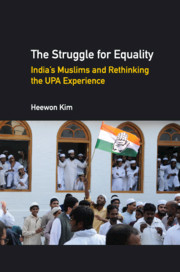Book contents
- Frontmatter
- Dedication
- Contents
- List of Tables and Figures
- List of Abbreviations
- Acknowledgements
- Introduction
- 1 Opening Up the ‘Black Box’ of Public Policy: Towards an Institutional Analysis of India's Policies on Religious Minorities
- 2 Constitution-Making, Equality of Opportunity and Religious Minorities: Reassessing the Critical Juncture
- 3 The UPA in Power: The New Equal Opportunities Framework, Religious Minorities and the Limits of Change
- 4 UPA, Muslims and Public Sector Employment: Assessing the Record
- 5 UPA, Muslims and Service Delivery
- 6 UPA, Muslims and the Communal Violence Bill
- Conclusion
- Appendix Recruitment of minorities in central government departments and public sector undertakings
- Bibliography
- Index
Conclusion
Published online by Cambridge University Press: 12 February 2019
- Frontmatter
- Dedication
- Contents
- List of Tables and Figures
- List of Abbreviations
- Acknowledgements
- Introduction
- 1 Opening Up the ‘Black Box’ of Public Policy: Towards an Institutional Analysis of India's Policies on Religious Minorities
- 2 Constitution-Making, Equality of Opportunity and Religious Minorities: Reassessing the Critical Juncture
- 3 The UPA in Power: The New Equal Opportunities Framework, Religious Minorities and the Limits of Change
- 4 UPA, Muslims and Public Sector Employment: Assessing the Record
- 5 UPA, Muslims and Service Delivery
- 6 UPA, Muslims and the Communal Violence Bill
- Conclusion
- Appendix Recruitment of minorities in central government departments and public sector undertakings
- Bibliography
- Index
Summary
The May 2014 Lok Sabha elections mark a major turning point in Indian politics: the dramatic collapse in the Congress and UPA vote and representation in Parliament signals the end of the contestational juncture in policies on religious minorities which began in 2004. The transformational victory of the BJP, with 31 per cent of the popular vote and 282 MPs, is the first time that a single party has won an outright majority at the centre since 1984. The results seem to have arrested the long process of regionalisation of Indian politics that commenced in the 1980s, and though the BJP has formed a coalition with its NDA partners, the critical breakthrough in becoming the party of government, arguably, signifies the arrival of Hindutva as the governing ideology, albeit repackaged as development. The election of Narendra Modi, an OBC himself, who masterminded the campaign, and was the Chief Minister of Gujarat during the 2002 anti-Muslim riots, became the new symbol of the social and national transformation that had taken place in ‘Manmohan's India’ during the last decade.
The BJP in its election manifesto acknowledged that ‘a large section of the minority, and especially Muslim community, continues to be stymied in poverty’. ‘Modern India’, it continued,
must be a nation of equal opportunity. BJP is committed to ensure that all communities are equal partners in India's progress, as we believe India cannot progress if any segment of Indians is left behind. (BJP 2014)
The party's commitment to equal opportunities for minorities, especially Muslims, was devoid of any proposal for positive or affirmative action. In the event, the BJP's parliamentary party did not include a single minority MP: the party attracted the support of a mere 8 per cent of Muslim voters (Sardesai 2014). The BJP-led NDA's new approach to the minorities was articulated by Najma Heptullah, the Minister of Minority Affairs, who observed that ‘Muslims are not minorities. Parsis are’ (Times of India 2014b). The minister alleged that the concerns of Muslims about security arise primarily out of a ‘fear psychosis’ that has gripped the community (Hebbar 2014), and claimed Muslims would not have voted for Modi if they were apprehensive (IBN 2014).
- Type
- Chapter
- Information
- The Struggle for EqualityIndia's Muslims and Rethinking the UPA Experience, pp. 195 - 207Publisher: Cambridge University PressPrint publication year: 2019



